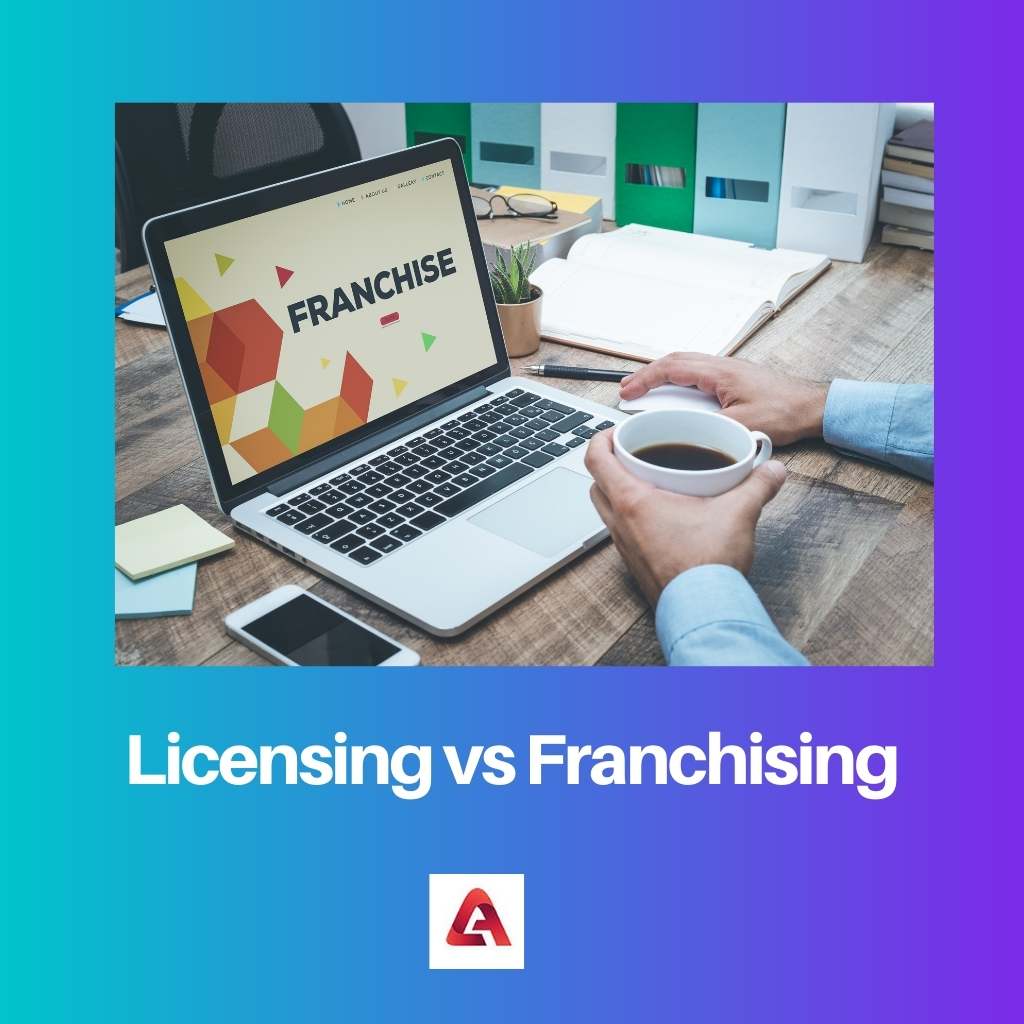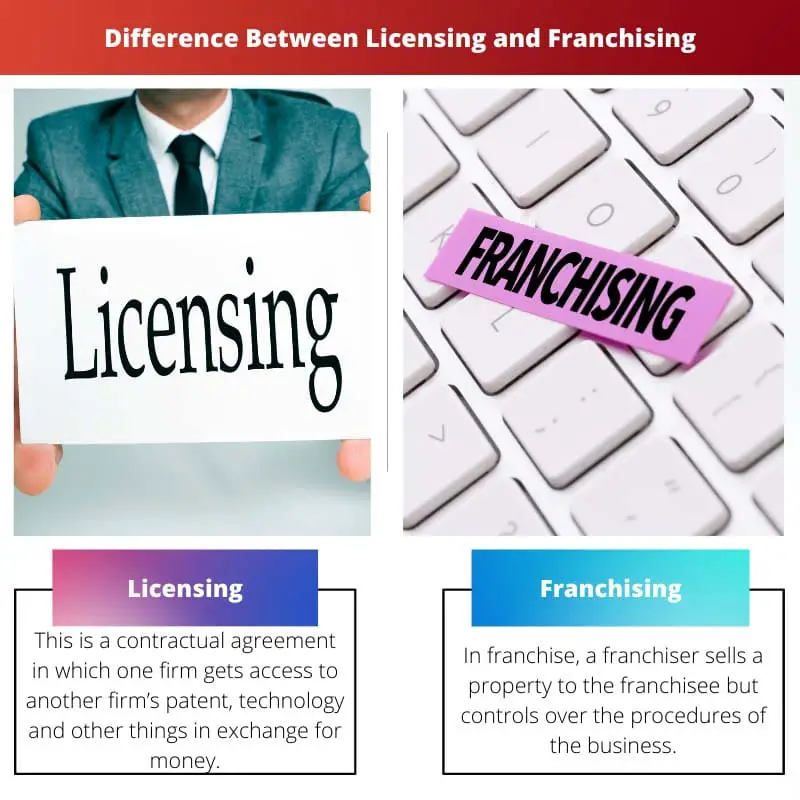Licensing and franchising are two types of agreement that are kind of similar and thus raise confusion in mind. Both are legit and safe agreements. If you are thinking of trying your hand at any, then you need to have a clear idea of the two.
Key Takeaways
- Licensing is the legal permission to use another company’s product, service or intellectual property in exchange for a fee or royalty. At the same time, franchising is a business model in which a company grants the right to use its brand and operating system to another company or individual.
- Licensing agreements are limited in scope and time, while franchise agreements are more extensive and long-term.
- Licensing agreements are less risky and involve less control over the licensee, while franchising involves more control over the franchisee and a higher level of risk.
Licensing vs Franchising
Licensing is where the licensor grants the licensee the right to use its intellectual property in exchange for a fee or royalty. Franchising is where a franchisor grants a franchisee the right to operate a business using its established brand, products, services, and operating system.

Licensing is a lease that helps extend goods and products without touching or affecting the brand value. Licensing is a contract that is done in exchange for money which is widely known as royalty.
The licensor does not have much control over the business. It is very common in the manufacturing industry.
Franchising is an agreement that can help extend the franchiser’s business. It does not face the limitations of geographical diversity. This way, the franchiser can spread the business without affecting the fame of the brand.
This agreement includes money as well. The franchisees get trained to hold the perfect brand value.
Comparison Table
| Parameters of Comparison | Licensing | Franchising |
|---|---|---|
| Meaning | This is a contractual agreement in which one firm gets access to another firm’s patent, technology and other things in exchange for money. | In franchise, a franchiser sells a property to the franchisee but controls over the procedures of the business. |
| Governed by | Contract law governs licensing. | Securities law govern franchising. |
| Registration | Licensing does not require registration. | Franchising requires registration. |
| Power to control | Licensors possess no control over licensees. | Franchisers have control over franchisees. |
| Example | Microsoft Office | Subway, MacDonald |
What is Licensing?
Licensing is a kind of agreement according to which the licensee can get access to the patent and technology of the licensor in exchange for some money. The money given in this process is called royalty.
For example, we can say that when a creator creates something unique, we see its merchandise getting viral. So the people who produce these merchandise take a license from the creator and use the designs and the characters.
The licensee always stays under the regulation of the licensor. The licensee must follow the terms and conditions prescribed in the agreement in order to use the licensed product legally.
However, the licensor does not have any power to regulate the business.
The licensing agreement comprises a one-time fee for the transfer of rights or property. Licensing does not include any support from the licensor. Licensing is done mainly for products and goods.
Licensor does not require to make any heavy capital investment.

What is Franchising?
Franchising is an agreement according to which the franchisee gets to use the trademark and logo of the franchiser’s business. Brands like Macdonald, Pizza Hut, Domino, etc., have many outlets to offer to customers scattered over the whole world.
All the mentioned brands have their trademark and signature dishes. The reputation of the franchiser gets enjoyed by all the franchisees.
These huge brand names do not prefer licensing over franchises. This is because, under licensing, the licensor can not control the business once the agreement takes place.
But in the franchising agreement, the franchiser can supervise the business during the agreement. This way, the franchisee can not harm the brand name and prestige by doing anything against the principle of the brand.
According to the agreement of franchising, the franchisee can not compromise with the quality and service of the patent brand name. All the technicalities and know-how skills are available for the franchisee to follow once the franchising gets implanted.
The management fees get included in the agreement.
Franchisors can enjoy the benefits of franchising as this way, they get access to the diverse marketplace without the boundary of geography, and they do not even need to compromise on brand value with this agreement.
The franchisee receives continuous support and training from the franchisor.
Main Differences Between Licensing and Franchising
- Licensing is a contract that allows the licensee to use the patents and technologies that belong to the licensor, whereas franchising is an agreement that includes selling a property, and the franchisers have full control over the business processes.
- Licensing agreements are governed by contract law, whereas franchising is governed by stricter securities law.
- Licensors possess no control over licensees, but according to franchising, the franchiser has control over franchisees and is entitled to govern the franchisee’s business.
- Licensee does not get any support in the course of business, but a franchisee gets guided, trained and instructed throughout the agreement.
- Registration is not a requirement in the case of licensing, but registration plays an important role in franchising.
- The money given in the licensing is called royalty, and the money that gets involved in the franchising is called management fees.

- http://nopr.niscair.res.in/handle/123456789/6058
- https://books.google.com/books?hl=en&lr=&id=2jh4EyC0M_wC&oi=fnd&pg=PR7&dq=licensing+and+franchising&ots=gC-tcm5EaO&sig=PPc_DYOWj-rEsAp6zEOKSfNk31M

The article sheds light on the confusion that some people might have between these 2 concepts. It’s a good overview.
It’s very clear that both concepts, even though they can look similar, have some strong differences. Especially, the risk level involved in each one of them is what makes them stand apart. It’s really interesting to see how the franchiser is the one having more control over the business when compared to the licensor.
It’s interesting how regulations differ between the two types of agreements.
It’s not only interesting but a key element to consider for people who are about to choose between both kinds of agreements. The control over the business makes franchising a riskier deal.
The post offers a detailed explanation about the differences between licensing and franchising. I found it really informative.
I have always been confused about these two. This post really helped me. Thanks.
Glad to hear that. Hope you have a better grasp of the topic now.
I wonder if the licensor ever regrets not having control over the business? Or if the control over the business is too much for a franchiser. That could happen, right?
Regardless of that, the post mentions the risks involved in each agreement. However, it doesn’t go into details about it.
I don’t think that’s a common issue. Usually, the franchising agreement grants the right amount of control to the franchiser. But I do get what you’re saying.
Incredible. This provided me with the necessary information to understand both types of agreements.